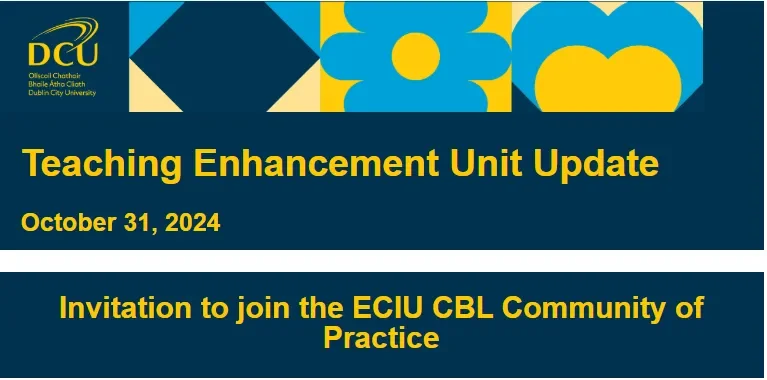
TEU Update October 31 2024

At the Community sessions, at 16:00 CET on the last Thursday of the month, participants follow the Reflective Team approach: a ‘Presenter’ illustrates a sticky issue and asks the “Team” for help with a specific question; the “Team” reflect on the case, sharing their own experiences, making suggestions for actions and concrete proposals to address the issue, the Presenter listens but does not join in the discussion; during the “Debrief” the Presenter identifies which proposals they might implement in their next CBL experience.
To give you a flavour of the issues presented during our sessions, here are some of the questions from the Spring 2024 sessions:
- Coaching students in a CBL setting: What can I do in the first weeks to ensure that students are not completely lost already at the beginning?
- Measuring the unmeasurable: How can we show students are developing transferable skills?
- How can we promote responsible partnerships with society while implementing CBL?
- What strategies can we implement to boost student recruitment?
The next topics during the October and November sessions are:
31st October 16.00 CET: How can we engage external stakeholders throughout a Challenge?
28th November 16.00 CET: How can we make peer observation of CBL more appealing?
If there is any issue you would like to present or see as the focus of a future session, please get in touch with the CoP facilitator Kate Riley (catherine.riley@unitn.it).

Date: Thursday, 21st November
Time: 10:00-11:30 am
Place: Glasnevin Campus, DG10, Bea Orpen Building
To support staff in designing in GenAI, we will share effective prompting strategies and demonstrate specific prompting examples during this 90-minute in-person session. Specific examples include using GenAI to create quizzes, generate cases/scenarios, assist students in brainstorming research topics, and create outputs that practise students’ higher-order thinking skills. Participants will have time to practise prompting during the session. Finally, we will also reflect on ethical use of GenAI and how to provide clear guidance of GenAI use for students. Because this is an in-person session, space is limited. Register at this link.
Should you have any questions, please feel free to email samantha.xu@dcu.ie

Introductory Workshop
This is the last chance to register for our introductory workshop, the ABC of ESD, which will take place on Wednesday, 6th November at 1pm in the Bea Orpen Building.
Institute of Education: ESD Day
A big thank you to everyone who came along to the IoE’s ESD day last week. We had two great keynotes, a fascinating panel discussion and an interactive workshop.
Look out for information on the follow-up day, which will explore how the ideas generated can be actioned, in the next few weeks.
We also had an amazing graphic harvester, Orlagh O’Brien, who captured the main points from the day in the above image.

The TEU are delighted to announce the addition of a page introducing curriculum design and signposting key resources, as part of the TEU pages on www.dcu.ie. The page is called ‘Curriculum Design: Process and Resources’ and includes easy access to the TEU Guides to Writing Learning Outcomes and Assessment Rubrics.
This addition will help signpost DCU staff to the variety of resources and support across the University and via Loop.

Focus on assessment and feedback
In last week’s TEU update we introduced you to two grading methods within the Loop Assignment activity: Rubrics and Ranged Rubrics.
There is another grading method known as the Marking Guide. The marking guide is akin to an electronic feedback form, where certain criteria are set for an assignment, a score is attributable to each one, and feedback can be composed for the student. The Marking Guide therefore allows for consistency and structure in grading students’ submissions, as well as flexibility in what scores to award and what feedback to give. The Marking Guide also supports ‘Frequently-used Comments’, which can be inserted into students’ feedback and help speed up the process.
Learn more about using Marking Guides in this resource from the Loop Staff Support Page.
Quiz Tip: Scaffold Learning with Quiz Attempts and Review Options
Loop quizzes offer you many options for formative assessment. For low-stakes quizzes, you can allow students multiple attempts to promote learning through repetition. You can also set Loop to take the highest grade or an average of all attempts. Pairing this with meaningful feedback on incorrect responses helps students reflect on their mistakes and gradually improve. Additionally, you can use the Quiz’s "Review Options” to determine exactly what students see after they complete the quiz. For low-stakes quizzes, allowing students to review the correct answers and their own responses allows them to reflect on where they need improvement. For high-stakes quizzes, you might limit feedback to scores only to ensure academic integrity is maintained. These options allow you to be strategic as to when and how quiz feedback is released. For more information on these Quiz settings, visit the Loop Staff Support Page.

If you require assistance or guidance with teaching and learning or Loop related matters, avail of the below methods.
Support for technical issues
For Loop technical queries, go to help.dcu.ie. You can also attend one of our regular online Loop drop in clinics, details in the TEU calendar. The drop in clinics are particularly useful for more complex queries. The Loop Staff Support Page also provides a comprehensive range of resources on Loop and Zoom. For new users, the enrolment key for this page is ‘staff’.
Advice on using technology for Teaching and Learning
If you are looking for advice on developing your teaching practice, including but not limited to the application of technology, please contact the TEU team teaching.enhancement@dcu.ie. We will endeavour to respond to you as soon as possible.
Consultancy request form
Interested in requesting a workshop or more extended consultation on a specific topic? Use this form.

